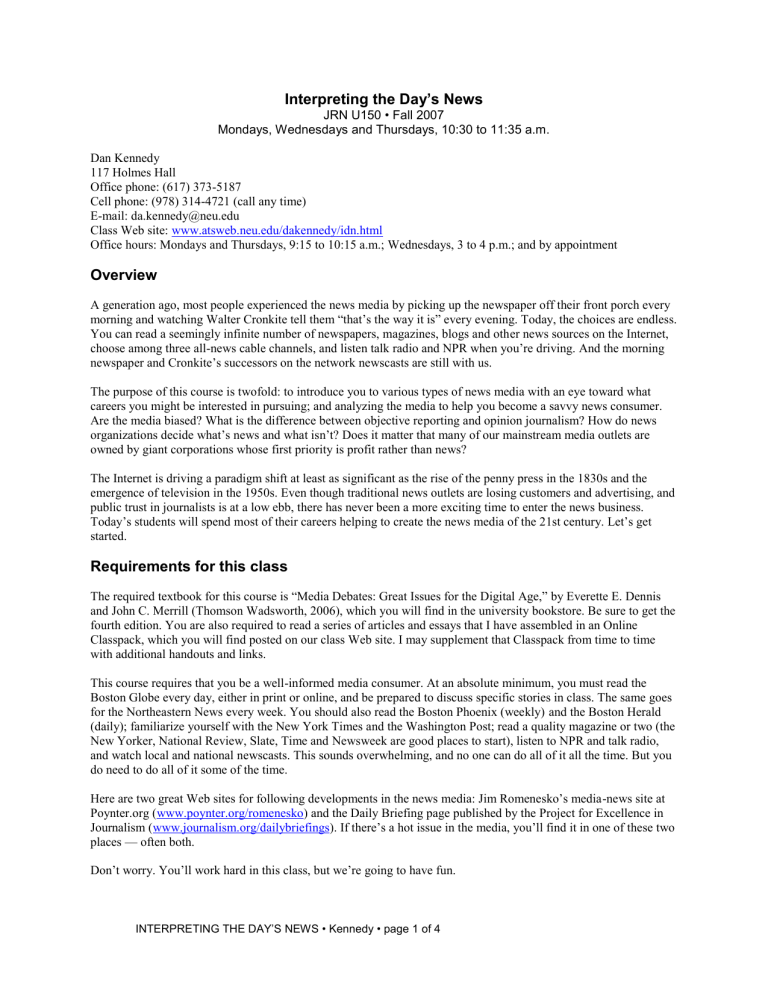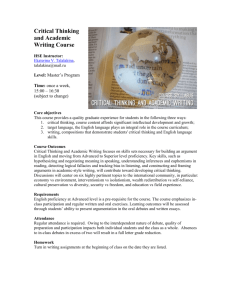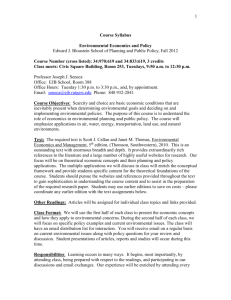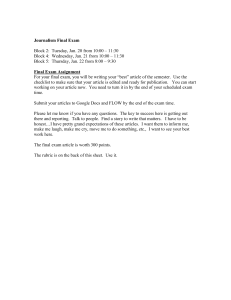Law of the Press - Northeastern University

Interpreting the Day’s News
JRN U150 • Fall 2007
Mondays, Wednesdays and Thursdays, 10:30 to 11:35 a.m.
Dan Kennedy
117 Holmes Hall
Office phone: (617) 373-5187
Cell phone: (978) 314-4721 (call any time)
E-mail: da.kennedy@neu.edu
Class Web site: www.atsweb.neu.edu/dakennedy/idn.html
Office hours: Mondays and Thursdays, 9:15 to 10:15 a.m.; Wednesdays, 3 to 4 p.m.; and by appointment
Overview
A generation ago, most people experienced the news media by picking up the newspaper off their front porch every morning and watching Walter Cronkite tell them “that’s the way it is” every evening. Today, the choices are endless.
You can read a seemingly infinite number of newspapers, magazines, blogs and other news sources on the Internet, choose among three all-news cable channels, and listen talk radio and NPR when you’re driving. And the morning newspaper and Cronkite’s successors on the network newscasts are still with us.
The purpose of this course is twofold: to introduce you to various types of news media with an eye toward what careers you might be interested in pursuing; and analyzing the media to help you become a savvy news consumer.
Are the media biased? What is the difference between objective reporting and opinion journalism? How do news organizations decide what’s news and what isn’t? Does it matter that many of our mainstream media outlets are owned by giant corporations whose first priority is profit rather than news?
The Internet is driving a paradigm shift at least as significant as the rise of the penny press in the 1830s and the emergence of television in the 1950s. Even though traditional news outlets are losing customers and advertising, and public trust in journalists is at a low ebb, there has never been a more exciting time to enter the news business.
Today’s students will spend most of their careers helping to create the news media of the 21st century. Let’s get started.
Requirements for this class
The required textbook for this course is “Media Debates: Great Issues for the Digital Age,” by Everette E. Dennis and John C. Merrill (Thomson Wadsworth, 2006), which you will find in the university bookstore. Be sure to get the fourth edition. You are also required to read a series of articles and essays that I have assembled in an Online
Classpack, which you will find posted on our class Web site. I may supplement that Classpack from time to time with additional handouts and links.
This course requires that you be a well-informed media consumer. At an absolute minimum, you must read the
Boston Globe every day, either in print or online, and be prepared to discuss specific stories in class. The same goes for the Northeastern News every week. You should also read the Boston Phoenix (weekly) and the Boston Herald
(daily); familiarize yourself with the New York Times and the Washington Post; read a quality magazine or two (the
New Yorker, National Review, Slate, Time and Newsweek are good places to start), listen to NPR and talk radio, and watch local and national newscasts. This sounds overwhelming, and no one can do all of it all the time. But you do need to do all of it some of the time.
Here are two great Web sites for following developments in the news media: Jim Romenesko’s media-news site at
Poynter.org ( www.poynter.org/romenesko ) and the Daily Briefing page published by the Project for Excellence in
Journalism ( www.journalism.org/dailybriefings ). If there’s a hot issue in the media, you’ll find it in one of these two places — often both.
Don’t worry. You’ll work hard in this class, but we’re going to have fun.
INTERPRETING THE DAY’S NEWS • Kennedy • page 1 of 4
School of Journalism attendance policy
Interpreting the Day’s News is a large class, and your attendance and active participation are crucial. The School of
Journalism requires that you attend at least 80 percent of all scheduled class meetings. If you miss 20 percent or more of scheduled classes, you will automatically fail. Every absence will have some effect on my assessment of your class participation, which will be factored into your final grade. Chronic tardiness may result in my marking you down for additional absences.
Please note that there is no such thing as an “excused absence.” If illness or a family emergency makes it impossible for you to meet the attendance requirement, then you will be unable to receive a passing grade. The attendance policy is not punitive; rather, it is a course requirement, no different from writing a paper or taking a final exam.
University statement regarding academic honesty
Northeastern University is committed to the principles of intellectual honesty and integrity. All members of the
Northeastern community are expected to maintain complete honesty in all academic work, presenting only that which is their own work in tests and all other assignments. If you have any questions regarding proper attribution of the work of others, please contact me prior to submitting the work for evaluation.
A personal note: The two capital offenses of journalism are fabrication and plagiarism. Commit either of these and you can expect to receive an “F” for the course, with possible referral to the student court. My presumption is that you are honest. But as Ronald Reagan said, “Trust, but verify.” I reserve the right to ask you about sources and notes at any time. (My own attribution: I consulted syllabuses written by Professors Chuck Fountain, Alan Schroeder and
Carlene Hempel in putting this together.)
You will find some excellent resources on plagiarism and how to avoid it at Plagiarism.org
.
Special accommodations
If you have physical, psychiatric or learning disabilities that may require accommodations for this course, please meet with me after class or during conference hours to discuss what adaptations might be helpful to you. The
Disability Resource Center, 20 Dodge Hall (x2675), can provide you with information and assistance. The university requires that you provide documentation of your disability to the DRC.
Assignments, deadlines and grades
During the semester we’ll have three tests on the readings and class discussions. These will be held on Oct. 4,
Nov. 1 and Dec. 3. The tests will consist of short answers and/or multiple choice, and should take you no more than a half-hour. Mark these dates on your calendar — there will be no make-ups. Each of these will count for 10 percent of your final grade.
We’ll also have a few unannounced quizzes on current events to make sure that you’re keeping up on the news.
These quizzes will count cumulatively for 10 percent of your final grade. Again, there will be no make-ups. At the end of the semester I will drop your lowest grade on these quizzes. If you missed a quiz, that’s the one I will drop.
The final exam will comprise a series of take-home questions, handed out near the end of the semester and due during exam week at a time to be announced. This will count for 30 percent of your final grade.
Another 20 percent of your final grade will be based on a 1,500- to 2,000-word paper in which you will explain how you stay informed. This paper will be due on Thursday, Nov. 15.
The remaining 10 percent will be based on your class participation and attendance.
INTERPRETING THE DAY’S NEWS • Kennedy • page 2 of 4
A word about our schedule
I will stick to the reading, quizzes and other work listed below as closely as possible. This course, however, is dependent on the news, and class discussion will often be based on what’s taking place in the world around us.
That’s why it is so important for you to know what’s going on. Expect a lot of multimedia and guest speakers as well. I will schedule speakers as they are able to attend, regardless of what topic we happen to be talking about at that time. My goal is not to lecture but, rather, to help you immerse yourselves in the media and make sense of that experience. Flexibility is essential.
Semester schedule
Week 1 Sept. 5 and 6
Class topic: Defining news and the news media
This week’s reading: “Media Debates,” Chapter 17; Online Classpack, Introduction to “The Elements of
Week 2
Journalism.”
Sept. 10, 12 and 13
Class topics: A historical overview of the national and local media; parts of a newspaper
This week’s reading: Online Classpack, “How Tip saved the Globe.”
Week 3
Class topic: Gatekeepers and gate-breakers — who decides what is news?
Sept. 17, 19 and 20
This week’s reading: “Media Debates,” Chapters 5 and 10; Online Classpack, Chapter 1 of “Warp Speed.”
Week 4 Sept. 24, 26 and 27
Class topic: Who owns the media — and why does it matter?
This week’s reading: “Media Debates,” Chapters 4 and 20; Online Classpack, Chapter 1 of “The New
Media Monopoly.”
Week 5
Class topic: Surveying the electronic mediasphere
Oct. 1, 3 and 4
This week’s reading: Online Classpack, the three “Outside Voices” essays posted on the CBS Public Eye
Web site.
We will have the first of our three tests on Thursday.
Week 6
Class topic: Advertising and public relations
Oct. 10 and 11
This week’s reading: “Media Debates,” Chapters 18 and 19; Online Classpack, “The Truth About Denial”
Week 7 and “Greenhouse Simplicities.”
Oct. 15, 17 and 18
Class topic: Manipulating the media — beyond public relations
This week’s reading: “Media Debates,” Chapters 2, 8 and 9; Online Classpack, “Miller’s Times.”
Week 8
Class topic: Manipulated by the media — playing for the cameras
Oct. 22, 24 and 25
INTERPRETING THE DAY’S NEWS • Kennedy • page 3 of 4
This week’s reading: “Media Debates,” Chapters 3, 6, 7 and 13; Online Classpack, “Bad News.”
Week 9
Class topic: Cable, the Internet and the 24-hour news cycle
Oct. 29, 31 and Nov. 1
This week’s reading: “Media Debates,” Chapter 14; Online Classpack, “The Power of the 24-Hour News
Cycle” (audio file).
We will have the second of our three tests on Thursday.
Week 10
Class topic: Reinventing the news — from multimedia to crowdsourcing
Nov. 5, 7 and 8
This week’s reading: Online Classpack, “To Save Themselves, US Newspapers Put Readers to Work.”
Week 11 Nov. 14 and 15
Class topic: The alternative press — up from the underground
This week’s reading: Online Classpack, “A Brief History of Alternative American Journalism in the
Twentieth Century.”
Your paper on how you stay informed will be due at the beginning of class on Thursday.
Week 12
Class topic: Freedom of the press
This week’s reading: “Media Debates,” Chapter 1; Online Classpack, “Shield Surge.”
Nov. 19
Week 13
Class topic (Monday): Freedom of the press, continued
Nov. 26, 28 and 29
Class topic (Wednesday and Thursday): Fairness, balance and so-called objectivity
This week’s reading: “Media Debates,” Chapters 11 and 12; Online Classpack, Introduction to “Bias,”
“What Liberal Media?” and the Society of Professional Journalists Code of Ethics.
Dec. 3 and 5 Week 14
Class topic: The road from here — careers in the news media
This week’s reading: Online Classpack, “Go to the Web, young journalist!”
We will have the third of our three tests on Monday.
Finals week
We will have a take-home exam this semester. Stay tuned for when your deadline will be.
Dec. 7-14
INTERPRETING THE DAY’S NEWS • Kennedy • page 4 of 4






